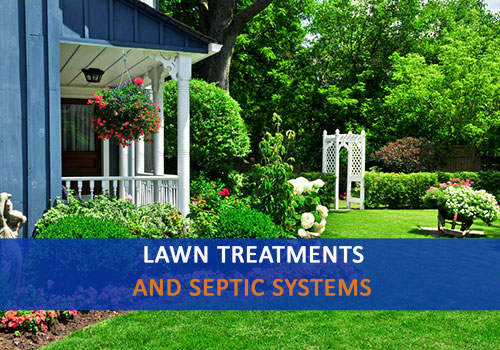You may think that having a septic system means no more lawn treatments, weed killers, fertilizers, or chemicals. And would that mean the end of a green, healthy yard? The answer is, lawn treatments and septic systems can get along, as long as you do it right!
While lawn treatments don’t necessarily damage septic systems, it takes sticking to proper remedies and correct use frequency. Today we will focus on finding the safest treatments for your yard and how to integrate those treatments into your routine in a way that keeps your septic healthy.

Lawn Treatments and Septic Systems Video
How Lawn Treatments Affect Your Septic System
The main concern of using chemical treatments on your lawn is its effect on the bacteria in your septic tank.
Your septic tank consists of good bacteria, liquid waste, and solid waste. There must be a proper balance for your system to separate your liquid and solid waste, allowing the solid waste to sink to the bottom of the tank. If the balance is off, the solid waste will not sink, causing clogs and blocks leading from your home and out into the leach field.
Lawn treatments and weed killers are designed to dissolve close to the surface of your lawn, so they are not likely to make it to the depth of your septic system. If properly installed, your system will be too deep to penetrate easily. Additionally, the tank and all parts of your system should be tightly sealed to protect the system from outside chemicals and liquids.
But that doesn’t mean you are free to treat your lawn with anything and at any time. It takes a bit more finesse and care than that.
3 Tips for Lawn Treatments & Septic System
1. Use Lawn Treatments Safely
Suppose you choose to use chemical treatments (including lawn treatments, fertilizer, and weed killer). In that case, you should follow the package’s directions exactly. Check the dilution ratio and do not vary from that ratio. Do not over apply the treatment.
Further, make sure to stay away from the yard for at least 48 hours after applying the chemicals to prevent chemical inhalation or contact. Now would not be an excellent time to schedule that septic pump-out or repair.
2. Dispose of the Treatment Safely
Do not dispose of your leftover lawn treatment or leftover solution into the septic system.
This includes flushing them down the sink or toilet. These chemicals can do severe damage to your septic system internally by messing up the balance of good bacteria, liquid, and solid waste that makes up your septic tank. This can cause backups into your home, clogs in the pipes throughout the system, or even severe and costly problems to your entire septic system.
If you do have excess lawn treatment and are unsure what to do with it, you can try offering it to neighbors or friends to use. Or, if that does not work and you are unsure what to do, you can contact your sanitation department for guidance, or you can ask your septic company for suggestions of how to dispose of the excess chemicals safely.
If you have been flushing your lawn chemicals down your drains without knowing the damage it can do, contact your septic company immediately. You may need a pump-out or assistance nursing the bacteria in your tank back to help.
3. Consider Alternative Options to Using Chemicals
You do not have to choose between using harsh chemicals on your lawn and protecting your septic system. There are alternatives to treatments for pests, lawn growth, and weeds.
Aerating your lawn can give your roots room to spread out and grow deeper and stronger. It can also give them more access to water from the sprinkler or rain.
You can choose to landscape using plants and shrubs that are native and do well in your climate. Native plants require much less work to stay alive and healthy, minimizing the need for additional treatments.
You can control your weeds by pouring boiling water on them, using a homemade mixture of vinegar, salt, and dish soap, or you can invest in a weed puller, allowing you to pull the weeds up by the roots with minimal damage to the grass around the weed.
To get rid of pests, you can place birdhouses around your yard to entice birds, natural predators to eat the pests that would destroy your lawn. If you want to have a little fun, you can get some chickens. They will eat all the bugs, slightly aerate your property with their scratching, and they will provide your family with fresh eggs.
Have Your Cake and Eat it Too!
Your septic system doesn’t have to destroy your landscaping dreams; in fact, lawn treatments and septic systems can get along! Use the tips from above. You can have a happy yard and a comfortable septic system, making your household a happy one.

